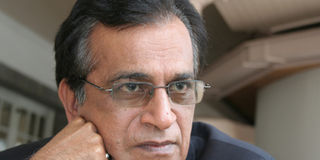WHO on the spot over flu ‘scare’

Dr Shahnaaz Shariff, the director of medical services during a press briefing on swine flu outbreak in the country last year. The World Health Organisation has defended itself over accusations that the policies and responses it undertook in the wake of the influenza pandemic were improperly influenced by the pharmaceutical industry. Photo/FILE
The World Health Organisation has defended itself against accusations that it colluded with multinational drug companies to create a case for the mass production of swine flu vaccines.
Dr Keiji Fukuda, the chief flu expert, told the Council of Europe in France on Tuesday that the influenza pandemic policies and responses recommended and taken by WHO were not improperly influenced by the pharmaceutical industry.
WHO has been accused that its declaration of the flu as a pandemic was not based on good science, consequently forcing governments to spend billions of dollars on vaccines that nobody needs.
Second delivery
Some 730,000 doses of these vaccines are expected to be shipped to Kenya any time now according to the Director of Public Health, Dr Shahnaaz Shariff. A second delivery is expected in the country in March.
According to extracts from Tuesday’s proceedings in the French town of Strasbourg and posted on the Council of Europe website, the committee says swine flu is the third incident where the world body is unjustifiably frightening the world.
“The world has been frightened by a series of health scares — SARS, Avian flu and now Swine flu. We now know, in hindsight, that the fears that were aroused do not appear to be justified. “With H1N1, did the WHO, once again, frighten the world without any substantial evidence?” questioned Paul Flynn of the UK.
In response, Dr Fukuda was categorical that WHO based its decisions on sound evidence. “This current influenza pandemic is a scientifically well-documented event. This is not an arbitrary matter of word-smithing, definitions or polemics.” He said those calling the epidemic fake were irresponsible and trivialised the deaths of more than 14 000 people who succumbed to the disease.
The strongest criticism at the proceedings was handed out by Dr Wolfgang Wodarg of Germany who wondered why a run-of-the-mill flu was turned into a worldwide pandemic which, he said, “made it possible for the pharmaceutical industry to transform this opportunity into cash, under contracts which were mainly secret.”
“In my view, the WHO undertook an incomprehensible action, which cannot be justified by scientific evidence. The Council of Europe should investigate this to see how WHO can undertake this kind of dangerous nonsense,” said Dr Wodarg.
Dispose stockpiles
Now the rich countries and WHO will also have to devise ways of disposing of millions of vaccine stockpiles they are holding, and one of them is to send them to Africa as donations or under other various trade arrangements.
Confirming that Africa is indeed a preferred destination for the stockpiles, Dr Fukuda said they were still working to see that poor countries got access to the drugs. He said WHO had solicited vaccines from commercial companies and rich governments and received substantial amounts for poor countries.
“Many of these countries, of course, are located in Africa and we will continue to try to get vaccines to them in as rapid a manner as is possible,” Dr Fukuda said. Despite the strong denial of any wrongdoing, the WHO has said it will institute internal investigations into the matter.




